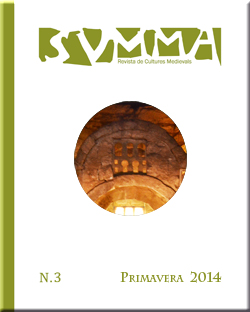The Intellectual Virtues (Nicomachean Ethics, Book VI) in Three Works of Popularization of Aristotelian Thought
DOI:
https://doi.org/10.1344/Svmma2014.3.4Paraules clau:
Aristotle, ethics, intellectual virtues, popularizationResum
This paper aims to analyse how the Aristotelian theory of the intellectual virtues (Nicomachean Ethics, Book VI) is formulated in a corpus of three compendia of Aristotle’s Ethics and two anthologies of moral philosophy which circulated in Castile from the 13th to the 15th century. These texts belong to the multifaceted medieval literature of popularization, which hoped to offer students of the Faculty of Arts, and a larger circle of noblemen eager for knowledge, access to the doctrines of the authors of classical Antiquity, especially to those of Aristotle, “The Philosopher”, the first auctoritas studied in medieval universities. The object of my analysis will therefore serve as an illustration of a larger phenomenon: the transmission of Aristotelian doctrines through works of popularization, which constitutes one of the most interesting modalities of reception of the corpus aristotelicum in Europe from the 13th century onwards.
Descàrregues
Publicades
Número
Secció
Llicència
Els autors que publiquen en aquesta revista estan d'acord amb els termes següents:
a. Els autors conserven els drets d'autoria i atorguen a la revista el dret de primera publicació de l'obra. SVMMA Revista de Cultures Medievals publica amb una llicència de Reconeixement-NoComercial-CompartirIgual 3.0 Espanya de Creative Commons, la qual permet compartir l'obra amb tercers, sempre que aquests en reconeguin l'autoria, sense ànim de lucre i compartin l'obra derivada en les mateixes condicions.
b. Els autors són lliures de fer acords contractuals addicionals independents per a la distribució no exclusiva de la versió de l'obra publicada a la revista (com ara la publicació en un repositori institucional o en un llibre), sempre que se'n reconegui la publicació inicial en aquesta revista.
c. S'encoratja els autors a publicar la seva obra en línia (en repositoris institucionals o a la seva pàgina web, per exemple), amb l'objectiu d'aconseguir intercanvis productius i fer que l'obra obtingui més citacions (vegeu The Effect of Open Access, en anglès).





